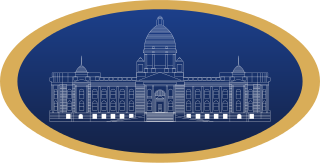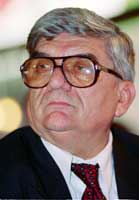
The National Assembly, fully the National Assembly of the Republic of Serbia, is the unicameral legislature of Serbia. The assembly is composed of 250 deputies who are proportionally elected to four-year terms by secret ballot. The assembly elects a president (speaker) who presides over the sessions.
Local elections were held in Serbia on 11 May 2008, concurrently with the 2008 Serbian parliamentary election and the 2008 Vojvodina provincial election. A re-vote was held at three poling stations in Belgrade on 18 May 2008 due to irregularities in the voting process.

The 1890–91 United States Senate elections were held on various dates in various states. As these U.S. Senate elections were prior to the ratification of the Seventeenth Amendment in 1913, senators were chosen by state legislatures. Senators were elected over a wide range of time throughout 1890 and 1891, and a seat may have been filled months late or remained vacant due to legislative deadlock. In these elections, terms were up for the senators in Class 3.
Local elections were held in Serbia over two rounds on 3 November and 17 November 1996, concurrently with the 1996 Vojvodina provincial election. The first day of voting also coincided with the 1996 Yugoslavian parliamentary election and the 1996 Montenegrin parliamentary election. This was the third local election cycle held while Serbia was a constituent member of the Federal Republic of Yugoslavia and the last time that Serbia oversaw local elections throughout Kosovo and Metohija until its controversial decision to hold elections in 2008.
Parliamentary elections were held in Serbia in November 1888, electing a Great National Assembly that would draft a new constitution. The result was a victory for the People's Radical Party.
Parliamentary elections were held in Serbia in April 1895. They followed a royal coup d'état by King Alexander in May 1894, in which he suspended the 1888 constitution and restored the 1869 constitution.
Parliamentary elections were held in Serbia on 12 December 1880 to elect members of the National Assembly. As expected, the elections resulted in a majority for the government, whose supporters won 94 seats, whilst Radicals won only 18 seats. By January 1881 the number of government supporters had risen to over 100, whilst the Radicals had split.
Nataša Jovanović is a Serbian politician. She was a prominent member of the far-right Serbian Radical Party (SRS) for many years until 2021, when she joined the Serbian Progressive Party (SNS). Jovanović is currently serving her seventh term in the Serbian parliament.
Petar Petrović is a Serbian politician. He served in the Serbian parliament for most of the period from 2001 to 2020, originally as a member of the Party of Serbian Unity (SSJ) and later with United Serbia (JS). Petrović has also held high office at the city level in Jagodina.

Radmilo Bogdanović was a high-ranking official of the Socialist Party of Serbia. He served as Minister of the Interior during major protests in 1991, after which he was forced to resign.
Biljana Ilić Stošić is a politician in Serbia. She served in the National Assembly of Serbia from 2012 to 2016 as a member of the Serbian Progressive Party. Since 2016, she has been commissioner of the Šumadija District.
Local elections were held in Serbia on 24 September 2000, concurrently with the first round of voting in the 2000 Yugoslavian general election and the 2000 Vojvodina provincial election. This was the fourth and final local electoral cycle to take place while Serbia was a member of the Federal Republic of Yugoslavia.
Dušan Golubović is a politician in Serbia. He served in the National Assembly of Serbia from 2001 to 2004, initially as a member of the Democratic Party of Serbia and later with the Democratic Party. He has also held high public office in Kragujevac.
Vlatko Rajković is a politician in Serbia. He was the mayor of Kragujevac from 2000 to 2004 and also served in the Assembly of the Federal Republic of Yugoslavia and the successor Assembly of Serbia and Montenegro in the same period. A member of the Democratic Party as an elected official, Rajković joined the New Party in 2013. Vlatko Rajković joined PSG in December 2022. and currently is head of local branch of PSG for Kragujevac and region of Central Serbia.
Slađan Radovanović is a politician in Serbia. He was the mayor of Rača from 2000 to 2004, held high municipal office in neighbouring Kragujevac from 2004 to 2014, and was a member of both the National Assembly of Serbia and the Assembly of Serbia and Montenegro. For most of his time as an elected official, Radovanović was a member of the Serbian Renewal Movement.
Živorad Nešić is a former politician in Serbia. He was the mayor of Kragujevac from 1992 to 1996 and also served in the National Assembly of Serbia from 1993 to 1994. During his political career, Nešić was a member of the Socialist Party of Serbia.
Predrag Stojanović is a Serbian academic and former politician. He served in the National Assembly of Serbia from 2001 to 2004 as a member of the Christian Democratic Party of Serbia and has held high political office in Kraljevo.
Dragomir Pavlović is a Serbian engineer and former politician. He served in the National Assembly of Serbia from 1997 to 2001 and was a delegate in the City Assembly of Belgrade for two terms. Originally a member of the far-right Serbian Radical Party (SRS), Pavlović later joined the breakaway Serbian Progressive Party (SNS).
Marina Petrović is a Serbian medical doctor and former politician. She served in the Serbian parliament from 1999 to 2001 as a member of the Yugoslav Left (JUL).


